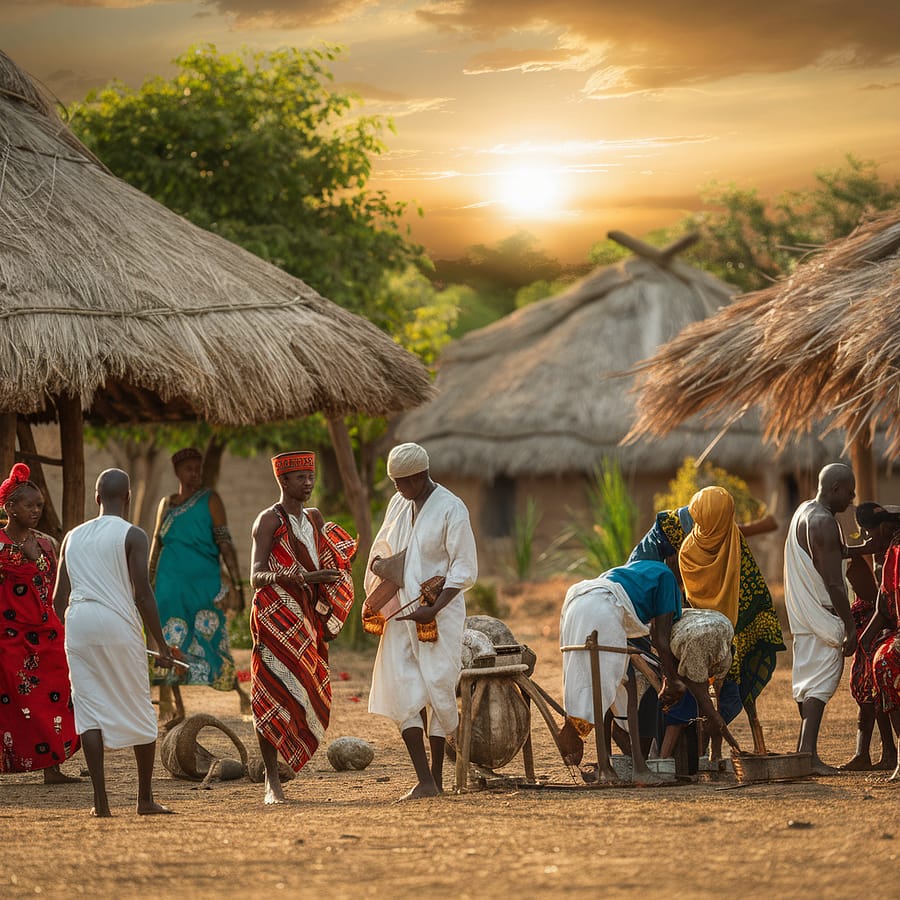Introduction
African cultural heritage is rich and diverse, encompassing traditional arts, languages, customs, and spirituality. However, globalization and modernization pose threats to these cultural elements, risking their disappearance. Efforts to revive and preserve African cultural heritage are crucial for maintaining identity and unity within communities. This article explores these efforts, highlighting community projects and the role of digital platforms in cultural preservation.
Revival of Traditional Arts
Traditional African arts, including music, dance, and visual arts, are integral to the continent’s cultural identity. Many communities have launched projects to revive these art forms, ensuring they are passed down to future generations.
- Music and Dance: In countries like Ghana and Nigeria, cultural groups are organizing festivals and workshops to teach traditional music and dance. These events not only entertain but also educate the youth about their cultural roots.
- Visual Arts: In Kenya, initiatives like the Nairobi Contemporary Art Institute promote traditional art forms. By providing platforms for local artists, they help preserve and celebrate African artistic heritage.
Preservation of Languages

Language is a key component of cultural identity, yet many African languages are endangered. Preservation efforts are underway to document and revitalize these languages.
- Documentation Projects: Linguists and cultural organizations are working to document African languages through audio recordings and written texts. Projects like the Endangered Languages Documentation Programme support these efforts.
- Educational Initiatives: In South Africa, schools are incorporating indigenous languages into their curricula. Programs like the Pan South African Language Board promote multilingualism and the use of native languages in education.
Sustaining Customs and Traditions
Customs and traditions are the lifeblood of African communities, reflecting their values and histories. Efforts to sustain these practices are essential for cultural continuity.
- Community Rituals: In Uganda, the revival of traditional ceremonies such as the “Empango” coronation anniversary helps reinforce cultural values and community bonds. These rituals are essential for passing down wisdom and customs.
- Craftsmanship: Traditional crafts like weaving and pottery are being revived through workshops and cooperatives. In Ethiopia, for instance, women’s groups are preserving the art of basket weaving, ensuring that these skills are not lost.
Revival of African Spirituality
African spirituality, often sidelined by modern religions, is seeing a resurgence. Communities are recognizing the importance of spiritual practices in their cultural identity.
- Ancestral Worship: In countries like Benin and Togo, there is a renewed interest in Vodun and other ancestral worship practices. Festivals and ceremonies celebrate these traditions, keeping them alive for future generations.
- Spiritual Education: Spiritual leaders are holding seminars and workshops to educate people about their spiritual heritage. These initiatives help integrate traditional beliefs with modern life, fostering a deeper sense of identity.
The Role of Digital Platforms
Digital platforms play a transformative role in preserving and promoting African cultural heritage. They provide accessible and widespread means to document, share, and educate about cultural practices.
- Social Media and Websites: Platforms like YouTube, Instagram, and dedicated cultural websites offer spaces for sharing traditional music, dance, and stories. For example, the “Afrocentricity International” website provides resources and articles on African culture and heritage.
- Mobile Applications: Apps like “African Storybook” offer digital storybooks in multiple African languages, making cultural education accessible to children across the continent. These tools are vital for language preservation and cultural education.
Community Projects Making an Impact
Numerous community projects across Africa are making significant strides in cultural preservation. Highlighting a few examples underscores the diverse efforts being undertaken.
- The Great Zimbabwe Living Heritage Programme: In Zimbabwe, this program focuses on preserving the ancient city of Great Zimbabwe. It includes training for local guides, conservation efforts, and cultural events that celebrate the site’s history.
- The Maasai Cultural Heritage Centre: Located in Tanzania, this centre works to preserve Maasai traditions through cultural tourism. Visitors learn about Maasai customs, rituals, and crafts, providing an economic boost to the community while promoting cultural understanding.
- The Nubian Vault Association: In West Africa, this organization helps revive traditional earth-building techniques. By promoting sustainable architecture, they preserve ancient building methods and provide affordable housing solutions.
Enhancing Cultural Awareness and Pride
These revival and preservation efforts significantly enhance cultural awareness and pride among African communities.
- Educational Outreach: Programs that teach traditional arts, languages, and customs in schools and community centres help young people understand and appreciate their heritage.
- Public Celebrations: Festivals and cultural events that showcase traditional practices bring communities together. They offer opportunities for collective celebration and reflection on shared cultural identity.
Fostering Unity and Identity
The preservation of cultural heritage fosters a strong sense of unity and identity within African communities.
- Community Engagement: Involving community members in preservation projects ensures that cultural practices are relevant and meaningful. This engagement strengthens communal bonds and promotes a collective identity.
- Intergenerational Transmission: Ensuring that cultural knowledge is passed down from elders to the younger generation is crucial. This transmission keeps traditions alive and reinforces a sense of belonging and continuity.
Conclusion
Efforts to revive and preserve African cultural heritage are vital for maintaining the continent’s rich and diverse identity. Through community projects, educational initiatives, and the use of digital platforms, traditional arts, languages, customs, and spirituality are being safeguarded for future generations. These initiatives not only enhance cultural awareness and pride but also foster unity and a strong sense of identity among African communities. As these efforts continue to grow, they will play an essential role in ensuring that Africa’s cultural heritage thrives in the modern world.
